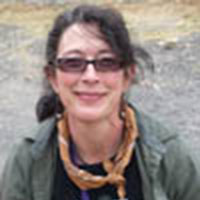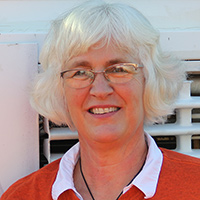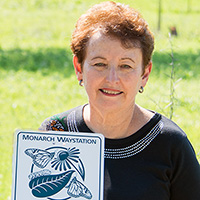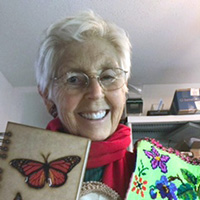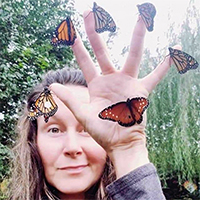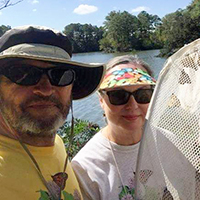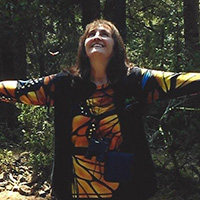 Introduction by Chip Taylor, Director of Monarch Watch We needed "boots on the ground" as they say - in this case, people who can help us deliver our message and see to it that milkweeds are planted. I came to learn that there were a number of people already doing this and I decided to invite them to join a group - a group of Monarch Conservation Specialists. As you will see, this is a group of accomplished people with substantial records of furthering monarch conservation. The expertise represented ranges from promoting monarch conservation with Federal and State agencies and nature centers to advocating the restoration of native plants, giving school programs and promoting and assisting with the creation of Monarch Waystations. We support the activities of these volunteers to educate the public about the need to create habitats for monarchs. We share resources among group members and solicit their advice on how we all can be more effective in promoting monarch conservation. We are pleased to have the assistance of these capable associates. Time permitting, the Monarch Conservation Specialists in your area can provide information to help you or your organization participate in monarch conservation. We would like to add more members to this group but are limited by funds at this time.
After Gail began a sabbatical from her position as a Pastoral Associate, she realized the fragile future of the monarch migration and never went back. She now dedicates her time to protecting and expanding monarch habitats throughout Arizona. Gail soon realized the importance of forging relationships with local and state agencies. She worked with the Arizona Department of Transportation to add milkweed to roadside seed mixes and collaborated with the U.S. Forest Service to create Monarch Waystations. She also advocates for the addition of milkweed and monarch friendly nectar plants in riparian areas and city parks throughout the state. Gail is involved in several monarch butterfly conservation projects. She coordinates the Southwest Monarch Study, monitors and trains volunteers for the Monarch Larva Monitoring Project, and tests monarchs for Ophryocystis elektroscirrha (O.e.) for Monarch Health. Gail monitors monarch habitats at the Rio Salado Restoration Habitat, the Phoenix Zoo, Tempe Marsh and other milkweed habitats around Arizona. Gail also conducts special educational opportunities and events to benefit monarch conservation and habitats around the state. People of all ages enjoy her programs including nature and garden clubs, college, high school and grade school students, scout and many other interested organizations. To better understand the monarch migration, every Fall Gail takes volunteers on field trips to tag monarchs in some of the most beautiful cienegas in Arizona. A life-long gardener, Gail became a Master Gardener in 1995 and completed the Desert Gardening Mastership Program in 2011. To meet the growing demand for regional milkweed varieties across the state she turned to Maricopa, Pinal and Gila County Master Gardeners to propagate milkweed plants to create Monarch Waystations for city libraries, schools and public parks.
Joyce is a retired RN, now devoting her time to monarchs, pollinator habitat restoration and educating others. She is a Master Gardener and has been part of the Monarch Watch Conservation Specialists before they were even named, which she feels is a great privilege. She's also involved with local hiking, appreciating the Pisgah National Forest and DuPont State Recreational Forest where there are native milkweeds and monarch waystations (among many others). She also belongs to two area native plant groups and has found time to explore other hobbies.
Denise has 35 years of experience as a Park Naturalist for the Maryland National Capital Park and Planning Commission. She has lectured and taught courses for other organizations including The National Arboretum, USDA Graduate School/Natural History Field Studies, and The Audubon Naturalist Society of the Mid-Atlantic States. For 25 years, she owned a native plant nursery specializing in host and nectar plants for butterflies. During that time, she designed and created habitat gardens for butterflies, hummingbirds, and other wildlife. She has had considerable experience creating butterfly meadows and Monarch Waystations. She contributed to Jim Wilson's Landscaping with Wildflowers: An Environmental Approach to Gardening, the Brooklyn Botanic Garden's guide Butterfly Gardens: Luring Nature's Loveliest Pollinators to Your Yard, and more recently to Connie Toops' and Bill Thompson's Hummingbirds and Butterflies. Denise often does contract work for park agencies. She has conducted butterfly inventories for the National Park Service. She has also collected and propagated seeds of rare native plant species for reintroduction on federal parklands. Denise's obsession with monarchs was launched by a phone call to Dr. Lincoln Brower at the University of Florida. Her objective was to quickly check her facts about the fall monarch migration before conducting a training workshop for 2nd grade teachers. That 90-minute phone discussion was a turning point. Two years later, under the leadership of Dr. Brower, she embarked on a new path, from naturalist to citizen scientist. The project was to monitor and tag fall migrating monarchs at Chincoteague NWR on Assateague Island, VA. A Monarch Management Plan was developed based on data and observations collected during the study. It contains recommendations for habitat enhancement projects and management strategies to benefit monarchs passing through the refuge during their fall migration. Implementation of the plan was initiated in May 2009. As part of the plan, Denise returns to the island each spring and fall to plant nectar-rich seaside goldenrod plants at this critical stopover.
Ina Warren (Brevard, NC - south of Asheville) is a freelance naturalist, lecturer, and educator and lives everyday in complete awe of the natural world. Her passion for volunteerism led her to serve over twenty years on the NC Bartram Trail Society Board and to create a group of Master Gardener educators called Monarch Mentors. In Transylvania County, the Monarch Mentors have visited area schools assisting teachers in learning about monarchs in their classrooms and planting school butterfly gardens. Warren has traveled to Mexico four times to study the monarchs in the over-wintering reserves and is a contributor to a growing group of educators called the Monarch Teacher Network. She is publishing her second book entitled, "Monarch and Milkweed Almanac." It is 365 pages in length in a "page a day" format and covers all aspects of the monarch life cycle, issues related to migration, milkweeds, and Mexico. It also includes an extensive section, (a botanico-pedia of sorts) of nectar flowers for Monarch Waystations. She is a frequent presenter at the NC Center for the Advancement of Teaching at WCU in Cullowhee, NC and has taught natural history courses at Brevard College, the Pisgah Forest Institute, US Forest Service's Cradle of Forestry, Great Smoky Mountains Institute at Tremont, the NC Arboretum and related venues. She is a Certified Environmental Educator for the State of NC.
After a lengthy career in human resources in the corporate automotive industry, I retired and began enjoying all aspects of nature every day rather than only on weekends and holidays. A number of years ago, I brought a single stalk of common milkweed with one monarch egg into the house. I observed its development and eventual eclosure into a beautiful male butterfly. I then began studying and learning all that I could about Monarch Butterflies. The following year I began tagging and have increased the number of butterflies that I have raised, captured and tagged each year. This year I will be tagging 300 butterflies. I have visited sanctuaries in Mexico three times over the past four years. Most recently, on behalf of Monarch Watch, I have begun purchasing tags from local Mexicans at the sanctuaries. Locally, I present programs focusing on Monarch Butterflies, wild mushrooms around the world and daylilies.
Debbie started raising monarchs 40 years ago while growing up near the cornfields in Iowa, spending most of the summers camping, exploring the Great Outdoors. (She considered entomology studies at college but chose to avoid Latin and studied engineering instead.) That hobby turned into an obsession and a passion to share her knowledge with others. In the last few years, Debbie's given dozens of programs in school classrooms, community service groups, garden clubs, retirement centers and parks & rec venues. In order to hand out hundreds of caterpillars, she began breeding monarchs too. She found that watching 9 year olds or 49 year olds discover the beauty of a newly eclosed monarch or grin with a caterpillar wriggling across their forearm is a joy! In addition to conducting Monarch butterfly programs, she's creating a network of monarch enthusiasts who are themselves sharing caterpillars and growing milkweeds. They are also being tutored to breed and give out caterpillars too; the Monarch Outreach plan is growing!
Ba Rea is a naturalist, illustrator and writer with a small publishing company, Bas Relief, LLC which publishes books on monarch butterflies and the milkweed community and other natural history themes for educational use. She received a BS in Visual Literacy from the University of Illinois in 1980. It was an individual plan of study combining courses in illustration, educational psychology and a wide range of natural history study and designed to help her produce illustrations and written materials to explain scientific and natural phenomena. She completed an elementary teaching certification course at Chatham University in 1996 to better understand how to create programs and materials for classroom use. In 2001 she got her Masters in Writing for Children and Adolescents from Chatham University with a concentration on writing about natural history subjects for children of different ages. In 1970, when she first discovered monarchs, Ba was actually on an informal botany quest to understand how a milkweed umbel full of pink, fleshy florets was going to turn into the fuzz and seed filled milkweed pods with which she was familiar. The smooth-skinned, striped caterpillars with the bouncy, black, antenna-like protrusions front and back were a surprise. She brought them home as part of the bouquet to watch and draw. Finding a fully formed, gold speckled, jade-green monarch chrysalis hanging from the edge of a dresser was a complete surprise. When the chrysalides started turning orange and black, she made a point of sticking around to watch for the emergence of the butterfly. What magic! She has been raising and releasing monarchs; searching, drawing and working to better understand milkweed; and spreading the word about these marvelous organisms ever since. She shares what she has learned through her books, classes and public programs. Teachers and students leaving her classes report that they are no longer able to drive through town without noticing the milkweed. Since 2001, every August, Ba teaches Monarchs in the Classroom Here and Now, a course offered with Pennsylvania intermediate unit and Act 48 credit and sponsored by the Pittsburgh Children's Museum, for teachers who want to use monarchs in their classrooms. Ba's published books work to spread awareness of monarchs and milkweed all over the continent. In 2003, along with Karen Oberhauser and Mike Quinn and with the help of many other entomologists and monarch enthusiasts, Ba co-authored, designed and published Milkweed, Monarchs and More, A Field Guide to the Invertebrate Community in the Milkweed Patch. It was originally designed to help citizen scientist volunteers in the Monarch Larva Monitoring Project describe and record what they were finding in their investigations. It has since moved into classrooms and nature centers and has come out in two updated versions: one enlarged for older eyes and easier classroom use and one small for easy field use. Other books Ba has published include: Monarch Come Play with Me! (and the Spanish version Monarca Ven! Juega Conmigo) -- a pre-K through second grade look at the monarch lifecycle; Milkweed Visitors, written and photographed by Mary Holland -- an introduction for elementary school students to the community that lives in the milkweed patch; and Learning from Monarchs, Teachers' Handbook -a comprehensive look at monarchs, the monarch community, milkweed and classroom logistics to help teachers use monarchs in their classrooms. In her new home in West Virginia, Ba continues to increase awareness of monarchs and milkweed through public programs and creation of a monarch festival.
Pat Miller became interested in monarchs and monarch conservation while presenting talks on butterfly gardening for the University of Illinois Extension office as a Master Gardener. Pat's good friend, Jane, met Chip Taylor the year he launched the Monarch Waystation program and became interested in promoting the concept of monarch waystations. Jane and Pat traveled throughout the western Chicago area promoting monarch waystations. Following a trip to Mexico with Monarchs Across Georgia, Pat's interest in monarchs blossomed into a program for school children, libraries, and garden clubs. Pat's love of nature led her into education through her work as a Master Gardener, Master Naturalist and Plant Technician for the Morton Arboretum. She presents programs to schools, libraries, garden and environmental clubs throughout the Chicago area. In 2008 Pat presented monarch programs to over 1000 students and 500 adults, a number she hopes will grow every year. She continues to share her love of monarchs with everyone she meets. In 2007 the Chicago Tribune wrote an article about Pat's efforts in establishing Monarch Waystations in the area. In 2009, Pat was labeled "Queen of the Monarchs" in a second Chicago Tribune article. "Education and awareness are key issues in protecting this wonderful creature". Pat is also involved in raising and tagging hundreds of monarchs. "A lot can be learned from this little creature" and Pat hopes to find even more ways to educate others in the coming years through the Monarch Watch Conservation Specialist role.
Trecia has been a biologist at Fernbank Science Center in Atlanta since 1990. Her areas of expertise are ornithology, environmental education, and establishing outdoor classrooms and gardens at schools. For the last eight years, she has been teaching students and teachers about the wonders of monarchs by teaching Professional Development courses in Michoacán, Mexico to study the biology and ecology of the Monarch butterfly in its overwintering habitat. Trecia also served as co-committee chair of Monarchs Across Georgia for three years, is also a committee member and actively tags with the teachers from DeKalb county and promotes the citizen science projects of Monarch Health, Journey North, and Monarch Larva Monitoring Project. Trecia has a bachelor's and master's degree in biology with an emphasis in animal behavior and science education. Trecia is also responsible for organizing the School Master Gardener program that has trained over 165 Master Gardeners from 42 different schools across DeKalb County. Since 2003 these participants have volunteered over 16,810 hours at their local schoolhouses working with over 31,842 students. Numerous Junior Master Gardener Clubs have been formed in the local schoolhouses and the program was awarded the Outstanding Volunteer Service in Environmental Education Award from EEA in 2007. This program has also brought in over $63,461 in grant money at the local schools just since 2008.
After visiting the Mexican overwintering colonies with Dr. Bill Calvert in March 2003, Susan began volunteering with Monarchs Across Georgia (MAG), a committee of Environmental Education Alliance of Georgia. She facilitates educator workshops using the Monarchs & More curriculum, and incorporating the citizen science projects of MLMP, Journey North tracking, Monarch Watch tagging and Waystations, and Project Monarch Health. Susan is a Trainer for MLMP and coordinates the Integrated Monarch Monitoring Project (IMMP) in Georgia. She has administered MAG's Pollinator Habitat Restoration Grants since 2012 through FWS' Partners in Fish & Wildlife Program and was honored with a Conservation Partner Award for her work with monarchs at the 2015-16 Southeast Regional Director's Honor Awards Ceremony. Organizing trips to the Mexican overwintering colonies since 2004, she initiated the Mexico Book Project, bringing books written in Spanish to schools near the sanctuaries. In 2018, Susan agreed to coordinate the Symbolic Monarch Migration, a 22-year old program created by Journey North. Susan received her BS in Microbiology and MS in Environmental Science from Louisiana State University, Baton Rouge and Florida Institute of Technology respectively. She retired as an instructor from Stone Mountain Memorial Association where she taught K-12 students a variety of science-based lessons from geology to life cycles. Susan is also a Georgia Master Gardener, Master Naturalist, and certified Environmental Educator.
I am the author of "Learn About Butterflies in the Garden", owner of Brenda's Butterfly Habitat, a Co-founder and past president of I have been giving lectures on Butterfly Gardening since 2004. I have also been on several television programs and in newspaper articles talking about butterflies. Monarchs have a special place in my heart. They were the first butterflies that I raised. In 2009 and 2010, I went to three of the Monarch colonies in Mexico with Monarchs Across Georgia. My butterfly house is located at 6414 Merriman Road, Westland MI 48185. It has butterflies, which are native to Michigan, and their host plants. This allows people to see the life cycle of the butterflies that they can have in their yards. Each year I give 1000s of caterpillars away. I take donations for the Monarch caterpillars to raise money for Monarch Watch.
Carol moved to North Texas a couple of decades ago and has been studying the native plants of Texas ever since, with special attention paid to their usefulness to birds and insects. She is a Texas Master Naturalist, has been president of the Collin County chapter of the Native Plant Society of Texas, and co-administrates a native bee Facebook page for the Texas Parks and Wildlife Department. She is a frequent guest speaker at schools, and for garden clubs, Master Naturalists, Native Plant Society chapters and other groups. Carol and her husband own Clark Haven Farm, a 37-acre wildlife refuge and native wildflower seed business. With over 350 species of native plants naturally occurring on the property, Monarchs and other insects have plenty of ready habitat on the farm. Lately, she's been experimenting with novel propagation techniques for native milkweeds, and working to increase seed and mature plant availability of native milkweeds by coordinating with local ranchers and growers. When she's not busy with plant and Monarch projects, she is a private Math and Science tutor.
Rhonda became interested in nature while walking along the lane with her grandmother to bring in the milk cows while she was very young. Growing up in Florida, Kentucky, and Illinois helped her to value the diversity of the differing landscapes and seasons. She trained as a University of IL Extension Master Gardener in 1996. She loves to work with children and see them understand more of the interactions of the world around them. She found her niche to educate others and give back as a Monarch Watch Tagger in 1997, sharing education, conservation and research associated with the Monarch Butterfly as part of Monarch Watch with individuals and groups of all ages. She was recognized by the State of IL Master Gardener program in 1999 for her Monarch Conservation work with approximately 1,400 youth annually. Rhonda's rural property became Monarch Waystation #17 in July of 2005. She has championed the conservation needs of the monarch in all levels of Schools, Libraries, Nature centers, Children's museums, Garden clubs, Senior centers, as well as with Boy Scouts, Girl Scouts and 4-H clubs. In 2008 Rhonda became an active trainer for the Monarch Teacher Network in the first Illinois workshop, to help local teachers gain the knowledge to more effectively use monarchs in their classrooms. Rhonda had the pleasure to travel to Mexico with a MTN tour group and marvel at that part of the migration story. In 2014 Rhonda & her husband outfitted a renovated school bus to become a rolling resource center & greenhouse as "Ms MariPosa" to educate others and serve as a home for the books, posters, and her accumulations of materials to educate all ages. Rhonda is happy to see her hometown of Galesburg, IL is now host to the annual Monarch Migration Festival which encourages the establishment of more Monarch Waystations in the corn belt. Her personal soapbox is good stewardship of the land while trying to restore summer breeding habitat of the monarch.
Susie Vanderlip has been devoted to environmental issues since 1968 when, as a student at UCLA, she was one of 12 students that created the Environmental Vanguard to work with Congressman Bell and protect the Santa Monica Mountains. In recent years, she became an Al Gore Climate Reality Leader. In 2010, she had a ruptured appendix that brought her to screeching halt for 4 weeks during which she sat in her garden with her camera in hand, snapping photos. It was then that she captured her first photos and videos of monarch caterpillars, chrysalis and butterflies. She was smitten! She turned her photos and videos into a children's photo storybook and 10-min live-action movie, The Story of Chester, the Monarch Caterpillar/Larva to inspire children ages 3-9 and adults to love monarchs and plant butterfly gardens (www.storyofchester.com). Thereafter, she refocused her 25-year professional speaking career towards speaking and writing to save monarch butterflies. Susie has raised hundreds of monarch butterflies in her garden since 2010 and became a Monarch Butterfly Citizen Scientist in 2014, tagging thru Cal Poly San Luis Obispo and O.e. testing for Monarch Health, University of Georgia. She continues to photograph and videotape, resulting in her line of photo greeting cards from the beauty in Nature and whimsy in life (www.svgreetingcards.com). She shares her anecdotal videos and monarch photos in her PPT presentation, Everything You Ever Wanted to Know About Monarch Butterflies. She is passionate about teaching young and old about the complexities of monarch butterfly life cycle and the factors impacting the severe population decline including climate change, habitat loss and pesticides. She is excited to bring her skills and experience to Monarch Watch and to do everything possible to Save the Monarchs and the planet.
Alice Ely (Westport, CT near Long Island Sound) had always loved her flower garden, and made a special effort to attract butterflies and hummingbirds, squeezing in time for gardening while running a busy marketing agency. Then, six years ago, one little Monarch set her on a new path: she found a Monarch chrysalis hanging from a tomato, and brought it inside to see it emerge. Once that first Monarch eclosed and climbed up her hand, she was smitten. She heard that a local land trust had just established something called a Monarch waystation. Intrigued, she looked up the registry and learned there were only 9 registered monarch waystations in CT at that time. She saw that her own garden met the criteria, registered it, then reached out to her town's community farm, to persuade them to create one, too. Soon, she was volunteering regularly at the town farm (planting milkweed, naturally!), and realized she wanted to keep spreading the word. She began sowing milkweed seedlings to give away at community events. To learn more, she enrolled in the UConn master gardener program, and became an advanced master gardener in 2019. This opened the door to added opportunities for outreach - schools, clubs and community gardens were calling, to get help in creating their own waystation/habitats. With a garden full of nectar plants and milkweed, Alice found it easy to begin raising Monarchs, sharing the wonder of their lifestages with audiences of all ages. Meanwhile, Alice helped initiate Westport's Pollinator Pathway chapter, and launched a series of Pollinator talks, which focus on planting natives, refraining from pesticides and creating habitats for pollinators. She started a garden coaching business, Garden with Alice, as a way to reach gardeners of all skill levels and encourage them to think of their gardens as habitats. Alice's current passion project is to propagate every species of milkweed that is native to the Northeast (9 down, 3 to go!) She has distributed thousands of free native seeds through her winter sowing classes and seed bomb activities for kids, plus hundreds of seedlings. (Alice is still on a quest to grow A. quadrifolia, A. viridiflora and A. rubra seeds, if anybody has some!) As of 2022, Connecticut has 475 Monarch waystations, a big leap from 9 in 2016!
Carol graduated from Pasadena City Jr. College and San Diego State College, with a degree in Special Education. She changed careers when her family was transferred to Chicago in 1968. After winning Realtor of the Year awards from local and state associations, she wrote a book on real estate recruiting, published newsletters, and created recruiting materials. She hosted recruiting conferences for industry leaders for 16 of her 46-year career. Known for her creativity and organizing skills she served on professional and community boards, committees and started groups to solve problems and get things done. Carol's experience with monarchs began long after retirement. She organized a Make A Difference Day milkweed collection project in 2016, for her Master Gardener Class. Pat Miller, one of Monarch Watch's first Conservation Specialists, has mentored her since that first event. Frequent lunches with two Garden Club friends, Delores Potter and Judy Wood led to starting, The Schaumburg Monarch Initiative, a monarch rearing and education group. In 2017 the butterfly ladies inspired the building of butterfly gardens at a restaurant and regional hospital. Not one of the founders had raised a monarch. So, they took lessons, raised money, built, and supplied three outdoor rearing cages and recruited and trained over 65 volunteers. In June 2018, the Schaumburg Monarch Initiative opened in space provided by the park district. The activities grew into educational programs with live monarch releases, twice daily, seven days a week. They won a Governor's Hometown Award after being nominated by the Village of Schaumburg. In 2019 over 6,000 guests attended the twice daily programs. All monarchs released were tested for OE disease, to avoid contaminating the 136-acre habitat. In 2020 Covid required volunteers to raise monarchs in their homes, but networking and outreach continued. In 2021 the Nature Center opened for a few weeks in August and September. 2,200 masked guests watched as monarchs were tagged and sent to Mexico. Carol led her group through Covid by forming partnerships and working with the Illinois Monarch Project, community groups, parks, libraries, schools, businesses, and governmental agencies. Her contribution to Monarch Watch will be focused on registering Monarch Waystations and marketing the environmental and financial benefits of protecting pollinator habitats. Everyone knows butterflies are good for the environment, but Carol can prove butterflies are good for business, too!
Retired CPA, letter carrier and Head Start teacher. Nature lover from birth. Resident with family in Gretna, Louisiana; formerly Phoenix, Arizona; Iowa City, Iowa and Bethesda, Maryland. Goddaughter and her family reside in Zitacuaro, Michoacan. Advocate for the migration starting 2016.
Teddi Zonker is a self-taught butterfly hobbyist for over 20 years, award-winning photographer and local municipality fitness manager. She is a Tarrant County Master Gardener and member of the Native Plant Society of Texas. Teddi has also completed the Native Landscape Certification Program and the Volunteer Advanced Training/Entomology program. Her love for gardening began in 2000 when she purchased her first home and had a lot of dirt to cover. On her lunch break she would frequent a local organic nursery to view and photograph pollinators and soon realized that she wanted to attract the pollinators photographed to her yard too! The nursery's first plant recommendation was Milkweed and it began; one plant, 80 caterpillars! Soon after, she began offering protection from predators to increase her own successful butterfly and moth population. Teddi's garden/Monarch Waystation was recognized in the Fort Worth Star Telegram (Show Us Your Yard) and as Yard of the Month (three times); her goal to create a habitat was on a roll! It also became recognized as a butterfly and pollinator habitat by Texas Discover Gardens, Monarch Joint Venture, Xerces Society, North American Butterfly Association and the National Wildlife Federation. In 2017, after a visit to the Monarch Sanctuaries in Mexico, she further realized the importance of educating others about the need for planting milkweed. In doing so, she is a Garden Coach which helps others convert suburban landscapes into pollinator habitats and Monarch Waystations. She also offers a pollinator talk which focuses on planting native and adaptive plants for pollinators, refraining from pesticides and creating habitats for a variety of pollinators. This talk has been provided to nature centers, garden clubs, college and grade school students, scout troops and other interested organizations. As an employee in the Parks and Recreation field since 1997, she has been able to share her passion at her day job too! In 2017, the recreation Summer Camp made nearly 2,000 seed bombs for the city parks and trails and Teddi spearheaded the NRH Monarch Restoration Program which provides Monarch education and encourages residents to create their own Waystation. Each year she brings her rearing kit to the recreation center and visits with members and guests of all ages about how to aid butterflies. With a B. S. in Public Relations and a M.S. in Recreation and Leisure Studies, her goal is to educate others on the need for pollinator spaces and show how simple (and enjoyable) it is to meet this need starting with their own back (and front) yard! Let's plant some Milkweed!
Deb is a Conservation Science Educator. She started Conservation Scientists in Action to connect students and families to wildlife ecosystem services, citizen science projects and stewardship activities. Her virtual eco expeditions showcase how conservation scientists are using scientific methods and tools to study and help species threatened by human actions. She has led over over 300 virtual expedition classes throughout North America and around the world. Although she has done classes on monarchs and other butterflies, she loves to focus on misunderstood animals, such as vultures, skunks, racoons, native bees, wasps, and moths. Deb also works as a Program Instructor for Conservation Halton where she engages the public and school groups in ecological literacy, indigenous history, and indigenous ecological knowledge. In the past, Deb has also conducted in-class workshops for Scientists in School on entomology and ornithology. She also served as Environmental Communications Director for over a decade at Earth Day Canada where she worked with environmental experts on ecological literacy projects for the government, corporations, schools and the general public. Deb is a volunteer Ambassador for Project Swallowtail and promotes and advocates for the planting of native species to support native pollinators and other wildlife. She is looking forward to partnering with community stakeholders to create Waystations to protect the iconic monarch butterfly and other wildlife in the process.
Rachel loves all things flora and fauna, but her conservation efforts have focused on the monarch butterfly for the past 10 years. Outside of owning an Executive Search firm in Salt Lake City with her husband, Pete, she spends much of her free time advancing the cause of the monarch. She started by growing native milkweed seedlings to give away, and quickly couldn't keep up with demand. Thinking outside the box, she partnered with the Utah Department of Corrections / Department of Education to have a Youth Correctional Facility grow milkweed in their greenhouse, which she shares freely with organizations large and small. In trade, she created and teaches the young men classes on monarchs, milkweed, and migration to fit into their ongoing education program. They have raised almost 5,000 seedlings to give away through this program! Gail Morris has graciously mentored Rachel for a number of years. Rachel now teaches seminars she calls "Saving the Monarchy"; helps teach people how to net and tag monarchs, and finds fun ways to engage Utahns in monarch conservation, such as a statewide photo contest on Facebook for the first documented monarch sighting per county - for a cash prize. She founded Utah Friends of Monarchs, now an official 501c3. She now focuses on encouraging corporations, municipalities, clubs, and individuals to add Monarch Waystations to their respective properties, providing appropriate seeds and expertise. A major success was getting the commitment of Intermountain Health, the largest hospital network in the Intermountain West, to include a Monarch Waystation as they redo each of their properties to become more sustainable. This effort began in 2022, with the completion of their first 5 hospital/clinic locations. With 200+ additional locations to work through, a migration path will be created from the most southern area of the state all the way to Idaho. Rachel participated in TEDxSaltLakeCity in 2022, giving a 12-minute talk on Saving the Monarchy, which you can find here: youtu.be/e4RPWJDDygw
Karen and Steve have been active members and volunteers of the Butterfly Society of Virginia since moving to Virginia Beach in 2003. They have served jointly on the BSV Board since 2009, previously and currently as Co-Directors, and also as Co-Vice Presidents (2014-2016) and as Co-Presidents (2016-2020). They also took classes and completed the requirements to become Certified Virginia Master Naturalists in 2016 and have been active in the Tidewater Chapter since then. Their volunteer activities with both BSV and TMN center primarily around lepidoptera. They have taught classes for the University of Virginia's OLLI (Osher Lifelong Learning Institute) program in Charlottesville and have made numerous presentations across the state to school and scout groups, garden clubs and master gardeners, master naturalist chapters, community and senior groups, and at butterfly festivals at Virginia Living Museum, Williamsburg Botanical Garden, and Norfolk Botanical Garden (and have also been long-time docents at NBG's native butterfly house). They especially enjoy educational outreach through setting up displays and talking one-on-one with attendees at conferences, flower and garden shows, festivals, and other community events. They have also volunteered regularly at annual monarch tagging events at various venues. They enjoy photography and gardening for wildlife and are proud of their Monarch Waystation #18392 and of their Certified Wildlife Habitat #122,195. One of the many rewards that comes with creating habitats is having the pleasure of attracting and observing a variety of species; as citizen scientist lepidopterists, Karen and Steve have had the opportunity to raise over 50 species of butterflies and moths to date. Steve's education included a B.A. in Architecture and senior level studies in structural engineering. His architectural influence gave him a holistic approach to science, and his engineering side has him squealing with delight as he dives deeply into the actual research studies, as opposed to the "results" reported by the media. He marvels at the ignored - but not refuted - monarch studies of decades ago. His biggest hero, besides Chip (and newest hero Dr. David James), is the Reppert Lab of UMass. They created the first genome of the migratory monarch and set the benchmark for identifying the actual genes and molecular components whose expressions produce the unique characteristics which we find marvelous in the monarchs and separate them from other lepidoptera. Karen's educational background includes a B.A. in English and double teaching certifications in Early Childhood (K-3) and Elementary Education (grades 4 thru 8). Her love of learning finds her constantly reading and exploring new subjects, and her love of teaching, which began in early childhood when she would gather the neighborhood children to 'play school', has remained strong. She and Steve look forward to continuing to share their knowledge and passion for lepidoptera with others as Monarch Conservation Specialists!
Education:
Oklahoma State University Over thirty years ago Marci began her career as a classroom teacher and her work in environmental education and advocacy. In 1990, Marci's first year as a classroom teacher, she serendipitously noticed a vine, (Cynanchum Laeve) growing in her yard--covered with Monarch Butterfly caterpillars! It was only natural to begin each school year after that allowing her students to make discoveries by observing the caterpillar's growth and development to adult. Through her work in environmental education, she had the opportunity to meet the staff of Monarch Watch in 1996 while attending the National Science Teaching Association's annual conference in St. Louis and heard Dr. Taylor speak. While serving on the committee to bring the American Cancer Society's Relay for Life to Broken Arrow, she contacted Monarch Watch to donate larvae (usually 200 early instar larvae) to be released as butterflies at the Survivor Ceremony in place of their tradition of releasing balloons. This would begin another twenty-year learning experience of rearing Monarchs in the classroom. In 2001 she organized a district wide drive to collect unneeded school supplies and art material which were shipped to Monarch Watch to be delivered to schools in Mexico, this continued for several years. For her efforts, the district received a citation from Monarch Watch for participation in the Monarch Watch Adopt a Classroom program. Marci considers herself fortunate to have attended a worldwide summit in 2001 at Monarch Watch in which all of the leading experts were presenting. She has observed both the peak of the Monarch Population in 1996 and the crash of 2013. In 2016 she organized the first Monarchs on the Mountain festival, a free annual education event to highlight the fall Monarch migration through Northeast Oklahoma. She continues to be chair for Monarchs on the Mountain, now in its eighth year. In 2017 by invitation, she participated in a statewide effort to bring together all the organizations in Oklahoma working in Monarch and Pollinator conservation, out of this the Oklahoma Monarch and Pollinator Collaborative, known as Okies for Monarchs, was formed. She currently serves on the education and outreach committee of the OMPC. In 2018 Marci brought her Monarch experience full circle, journeying to the overwintering sites in Mexico and learning from the butterfly expert Dr. Thomas Emmel. Marci enjoys sharing what she has learned and seeing eyes light up as people realize the complexity of the Monarch lifecycle, migration, the fragility of the habitat that supports this marvel and how they as individuals can make a positive difference. Among her other accomplishments: |
All material on this site © Monarch Watch unless otherwise noted. Terms of use.
Monarch Watch (888) TAGGING - or - (785) 864-4441
monarch@ku.edu



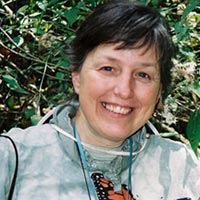
 Diane Pruden []
Diane Pruden []



